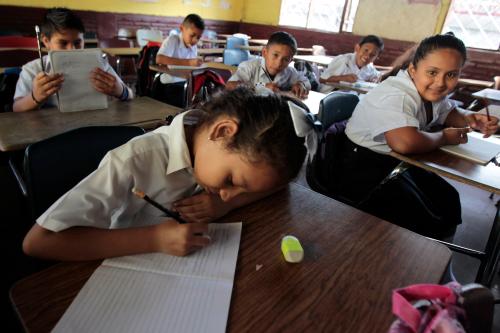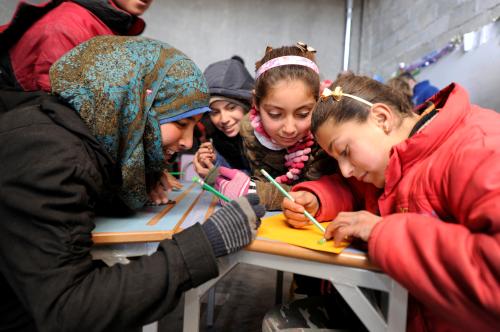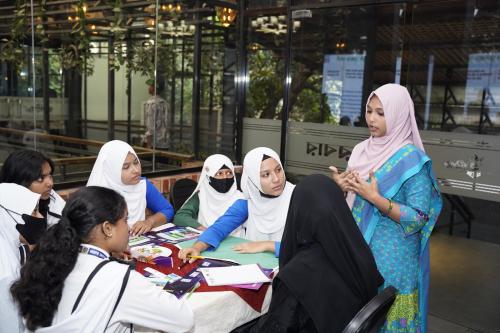This is the first blog post in a series about using data from 21st century skills assessments.
In developing the Education 2030 Agenda, it became clear that education systems require solutions to help prepare students for the challenges of today’s world. How can education empower learners of all ages to assume active roles—both locally and globally—and make informed decisions in building a more sustainable future through peaceful, tolerant, inclusive, and secure societies? Responses to this question have focused on Education for Sustainable Development (ESD) and Global Citizenship Education (GCED), both of which fall under the broad umbrella of 21st century skills.
Linked by the need for transformative education systems to address ESD and GCED, the UN’s Sustainable Development Goals (SDGs), Target 4.7 of Goal 4 states: “By 2030, ensure that all learners acquire the knowledge and skills needed to promote sustainable development, including, among others, through education for sustainable development and sustainable lifestyles, human rights, gender equality, promotion of a culture of peace and non-violence, global citizenship and appreciation of cultural diversity and of culture’s contribution to sustainable development.” Target 4.7 calls for mainstreaming key concepts of ESD and GCED in curricular content, teaching practices, and assessment, and for greater importance in policy planning.
For the measurement of learning outcomes on ESD and GCED, the main issue at the conceptual and operational levels is that of agreement on the definitions and dimensions of learning. While there is an overall consensus on the breakdown of learning measurement domains (knowledge, value, skills, engagement, and attitude), the understandings and interpretations on GCED and ESD greatly varies based on cultural, traditional, or other contextual lenses affecting the perceptions. Given the breadth of opinion at country, regional, and sub-regional levels over “what” we should be measuring, it is inevitable that there is also very little consensus on “how” we should measure it.
Considering the wide range of both established and relatively new concepts under the 21st century skills umbrella, and the absence of specific processes to collect and analyze related data, Target 4.7 is certainly one of the most challenging targets to measure and monitor. Competencies such as critical thinking, empathy, and creativity that are needed to promote sustainable development and global citizenship are comparatively more difficult than other targets in the SDGs to evaluate. As such, there have been debates on whether we should assess these skills globally in a standardized way at all.
A recent Brookings report shows that very few of the current international large scale assessments (ILSAs) explicitly capture 21st century skills. Another challenge includes the limited opportunities to link data collected through these tools in a statistically meaningful way due to lack of alignment across ILSA survey cycles. Concerns have been raised that current plans for measurement of the global indicator for 4.7 do not establish confidence that such indicators can be viewed from pure statistical perspectives. This could mean that traditional reporting of classical scores and rankings at country level in the monitoring for 21st century skills may be less relevant at the global level.
Given that sources of 21st century skills assessment data are relatively sparse, naturally the data use remains limited. At a policy level, most countries agree on the need for inclusion of 21st century skills in the education systems. However, there remains some resistance to including certain fundamental, but perhaps contextually “controversial” concepts of ESD and GCED— including human rights, gender equality, or climate change—in education policies and teaching materials. Some of these may be considered a national priority in some countries but seen as “sensitive” in others.
For the purpose of improving data quality and coverage, UN agencies active in the fields of ESD and GCED are working with cross-national data collectors to ensure that conceptual frameworks are aligned with standard definitions and respond to Target 4.7 reporting requirements. They also support data collectors through advocacy interventions at bilateral and multilateral levels to increase country participation in the data collection exercises to address gaps in coverage.
With respect to the gap in global monitoring of 21st century skills, solutions need to consider all the above challenges. Specific to UN agencies, two approaches are being adopted toward the provision of comparable data on 21st century skills related to ESD and GCED.
The first solution accepts that understanding of these skills depend on cultural, traditional, and other contextual lenses, and therefore they should be measured within “comparable” contexts. Accordingly, the design of some assessment frameworks is focused on sub-regional or regional coverage where there are greater common understandings. The Southeast Asia Primary Learning Metrics (SEA-PLM) and Life Skills and Citizenship Education (LSCE) Initiative in the Middle East and North Africa are examples of this perspective. The main argument here is that unless consensus at a regional level is in place on key definitions, values, behaviors, benchmarks, and thresholds on measurement of 21st century skills, global consensus will not be achieved.
The second solution accepts the core concept of national ownership and accountability in monitoring 21st century skills. Accordingly, each country needs to define the contextualized framework on necessary skills that respond to its own needs, and then link with the global trends, priorities, and requirements. Through such country-owned durable solutions, quality data could be collected regularly referencing results for national policies in a timely manner. In this regard, the development of “light” modules that includes key items from the existing ILSA could be made available to all countries as a common good might be a fundamental step. To achieve this goal, structured capacity development on data collection and analysis are essential.
The Brookings Institution is committed to quality, independence, and impact.
We are supported by a diverse array of funders. In line with our values and policies, each Brookings publication represents the sole views of its author(s).








Commentary
Monitoring for 21st century skills
Solutions adopted by the United Nations
November 26, 2018